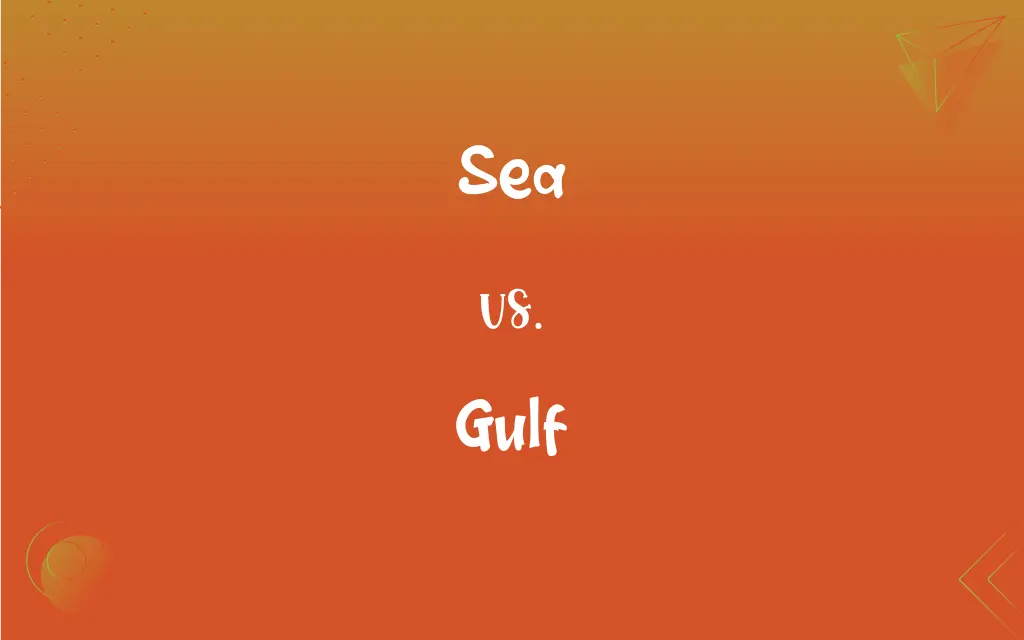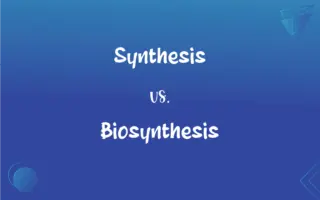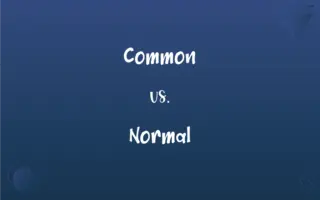Sea vs. Gulf: What's the Difference?
Edited by Aimie Carlson || By Janet White || Published on December 28, 2023
A sea is a large body of saltwater connected to an ocean, often surrounded by land, while a gulf is a deep inlet of the sea, typically narrower and more enclosed by land.

Key Differences
A sea is a vast body of saltwater that is generally smaller than an ocean and is typically connected to it, often partly or completely surrounded by land. In contrast, a gulf is a portion of the sea that penetrates land, usually characterized by its relatively narrow opening to the wider sea or ocean.
Seas are significant for their ecological and geographical features, often hosting diverse marine life and ecosystems. Gulfs, however, are often more defined by their geographical significance, forming important natural harbors and sometimes shaping the political and economic landscape of the surrounding regions.
The term "sea" can also refer to large saline lakes that are not connected to an ocean, like the Caspian Sea. A gulf, on the other hand, is specifically a maritime feature and does not have a counterpart in landlocked water bodies.
Seas can vary greatly in size, from relatively small bodies like the Sea of Marmara to massive ones like the Caribbean Sea. Gulfs, being a subset of seas, are typically smaller and more enclosed, such as the Gulf of Mexico.
Both seas and gulfs play crucial roles in global climate patterns and weather systems. However, due to their enclosed nature, gulfs can have unique climatic conditions compared to the more open and expansive seas.
ADVERTISEMENT
Comparison Chart
Size
Generally larger
Usually smaller and more enclosed
Connection to Ocean
Direct or indirect
Often through a narrow passage
Geographical Features
Surrounded partly or completely by land
Deeply penetrates land
Examples
Mediterranean Sea, Black Sea
Persian Gulf, Gulf of Thailand
Significance
Ecological diversity, climate impact
Natural harbors, regional importance
ADVERTISEMENT
Sea and Gulf Definitions
Sea
In some cases, a sea is a saltwater lake without direct access to the world's oceans.
The Caspian Sea is the world's largest inland body of water.
Gulf
Gulfs often serve as crucial points for maritime trade and naval strategy.
The Gulf of Aden is a key route for ships passing through the Suez Canal.
Sea
A sea can refer to a portion of an ocean partially enclosed by land.
The North Sea is bordered by several European countries.
Gulf
A gulf can be a deep, basin-like structure, surrounded by land on three sides.
The Persian Gulf is bordered by several Middle Eastern countries.
Sea
A sea is a large body of saltwater, smaller than an ocean.
The Red Sea is known for its vibrant coral reefs.
Gulf
A gulf is a large inlet from the sea into the landmass, often with a narrower opening.
The Gulf of Mexico is one of the world's largest gulfs.
Sea
A sea can also be a division of an ocean, separated by varying degrees of land or underwater formations.
The Sargasso Sea is defined by ocean currents in the North Atlantic.
Gulf
A gulf can significantly influence the climate and ecology of its surrounding regions.
The Gulf Stream significantly impacts the climate of nearby coastal areas.
Sea
Seas often serve as important routes for navigation and trade.
The South China Sea is a major maritime trade route.
Gulf
Gulfs are often named after the geographic region or the country they are near.
The Gulf of Alaska is known for its rich marine life.
Sea
The continuous body of salt water covering most of the earth's surface, especially this body regarded as a geophysical entity distinct from earth and sky.
Gulf
Abbr. G. A large area of a sea or ocean partially enclosed by land, especially a long landlocked portion of sea opening through a strait.
Sea
A tract of water within an ocean.
Gulf
A deep, wide chasm; an abyss.
FAQs
What defines a gulf?
A deep inlet of the sea, typically narrower and more enclosed by land.
Can seas exist without being part of an ocean?
Yes, some large saltwater lakes are also called seas, like the Caspian Sea.
Are gulfs always smaller than seas?
Generally, yes. Gulfs are a type of sea but are usually more enclosed.
How are seas important ecologically?
Seas host diverse marine ecosystems and are crucial for global climate patterns.
What role do gulfs play in geography?
They often form natural harbors and can influence regional climate and ecology.
Can a sea be landlocked?
Yes, some seas, like the Aral Sea, are entirely surrounded by land.
Are seas deeper than gulfs?
Not necessarily; depth varies based on geological features.
Can a sea be part of an ocean?
Yes, seas can be divisions of an ocean, like the Coral Sea in the Pacific Ocean.
What is a sea?
A large body of saltwater connected to an ocean, often partly surrounded by land.
Do gulfs influence local weather?
Yes, especially in coastal areas surrounding the gulf.
Do seas have unique ecosystems?
Yes, each sea can have distinct marine life and ecological conditions.
Can seas be entirely closed off from oceans?
Rarely, but some seas like the Dead Sea are nearly closed off.
Do all gulfs have narrow entrances?
Most do, but the size of the entrance can vary.
Do seas affect global climate?
Yes, seas play a significant role in global weather systems.
Can gulfs have unique biodiversity?
Yes, the enclosed nature of gulfs can lead to unique marine ecosystems.
Are all gulfs named after regions?
Many are, but not all. Naming conventions vary.
What is the largest gulf in the world?
The Gulf of Mexico is considered one of the largest.
What is the largest sea in the world?
The Philippine Sea is one of the largest seas.
What is a famous gulf for oil production?
The Persian Gulf is known for its extensive oil fields.
Are gulfs important for shipping?
Yes, many gulfs are key routes for maritime trade.
About Author
Written by
Janet WhiteJanet White has been an esteemed writer and blogger for Difference Wiki. Holding a Master's degree in Science and Medical Journalism from the prestigious Boston University, she has consistently demonstrated her expertise and passion for her field. When she's not immersed in her work, Janet relishes her time exercising, delving into a good book, and cherishing moments with friends and family.
Edited by
Aimie CarlsonAimie Carlson, holding a master's degree in English literature, is a fervent English language enthusiast. She lends her writing talents to Difference Wiki, a prominent website that specializes in comparisons, offering readers insightful analyses that both captivate and inform.






































































